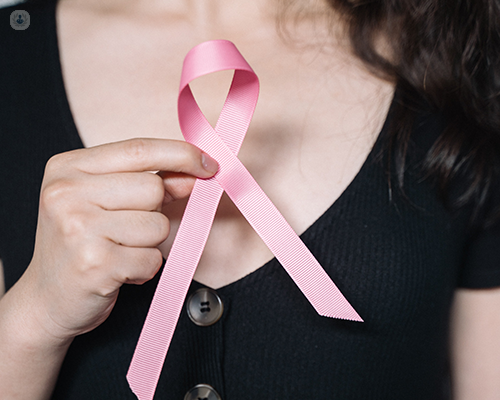Breast cancer genetics: The role of BRCA1 and BRCA2
Written in association with:Genetics plays a significant role in the development of breast cancer, significantly increasing a woman’s risk.
Mr Naren Basu, renowned consultant oncoplastic breast surgeon, provides an expert insight into breast cancer genetics, discussing the role of genes such as BRCA1 and BRCA2, the implications of genetic testing, and the treatment options available for those affected.

What is the role of genetics in breast cancer?
Genetics is a key factor in the development of breast cancer. Approximately 5-10% of breast cancer cases are hereditary, indicating that they result from inherited genetic mutations that are passed down through families.
Two of the most well-known genes linked to breast cancer are BRCA1 and BRCA2, tumour suppressor genes located on chromosomes 17 and 13, respectively, that are responsible for producing proteins that help repair damaged DNA. In a healthy individual, these proteins maintain the stability of the cell’s genetic material, preventing abnormal cell growth.
However, when mutations occur to either of these genes, this results in the proteins they produce being either faulty or absent, allowing damaged cells to proliferate. This can lead to cancer. Research indicates that women who inherit a harmful mutation in the BRCA1 gene have a 55-72% chance of developing breast cancer by the age of 70. In contrast, BRCA2 mutations confer a risk of about 45-69%.
If I test positive for a BRCA mutation, what are my options?
It can be overwhelming to find that you are carrying a BRCA1 or BRCA2 mutation. However, it’s important to note that several options are available, which will allow you to manage your risk. These include:
Increased screening
If you test positive for BRCA mutations, you will be advised to undergo enhanced surveillance. Typically, this will involve having annual mammograms starting at age 30 or earlier, and undergoing breast MRIs more frequently.
Medications
In some cases, chemoprevention may be recommended. This involves taking hormone therapy medications like Tamoxifen or Raloxifene, which have been shown to reduce the risk of breast cancer in high-risk women. These drugs work by blocking oestrogen receptors, slowing or stopping the growth of oestrogen-sensitive breast cancers.
Preventive surgery
If you have a very high risk of breast cancer, prophylactic (preventive) mastectomy may be recommended. This involves the surgical removal of one or both breasts to reduce the risk of cancer developing.
Besides prophylactic mastectomy, another surgical option is preventive oophorectomy. This involves the surgical removal of the ovaries, and it can reduce the risk of both breast and ovarian cancer.
Ultimately, the decision regarding which option to pursue is personal and should be made in consultation with a multidisciplinary team of specialists, along with your loved ones.
If I test negative for BRCA1 or BRCA2, can I still get breast cancer?
The answer is nuanced. While testing negative for these specific mutations can lower the likelihood of developing breast cancer, it doesn’t eliminate the risk altogether. In fact, the majority of breast cancer cases occur in people who don’t have a hereditary genetic mutation. This is because the risk of developing breast cancer is influenced by a combination of factors, including age, reproductive history, hormone exposure, lifestyle, and environmental factors.
Additionally, there are other genes besides BRCA1 and BRCA2 that are associated with an increased risk of breast cancer, like the genes TP53, PALB2, and ATM. For this reason, even if you test negative for BRCA mutations, you will be advised to continue screening and other breast cancer preventive measures based on your overall risk profile.
If you would like to book an appointment with Mr Naren Basu, head on over to his Top Doctors profile today.


